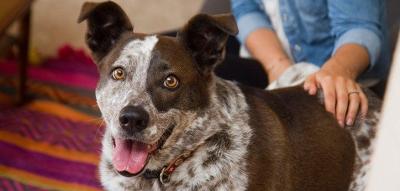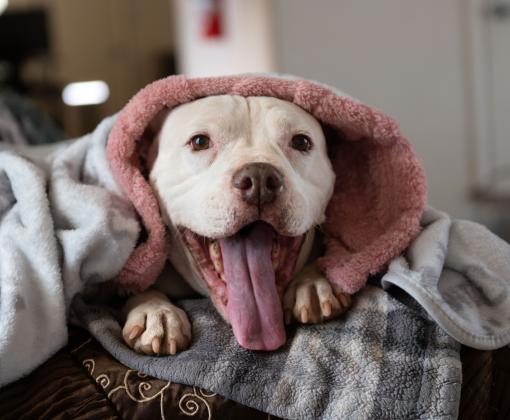
Bloat in Dogs: Gastric Dilatation and Volvulus (GDV)
Bloat, or gastric dilatation and volvulus (GDV), is a serious, life-threatening condition seen in dogs. GDV mainly affects large deep-chested dogs, but it can affect any size of dog. It happens when distention of the stomach with food and/or air together with the momentum of this now heavy organ by movement (walking or running) causes the stomach to “flip” upon itself, closing both the in-flow and out-flow passages. The stomach then becomes more and more distended, causing pressure on the large blood vessels of the abdomen, cardiac irregularities, difficulty breathing, tissue death and toxin release.
What causes bloat in dogs?
Many theories exist about why this scenario develops. An older but still accepted theory involves large dogs eating large quantities of food (particularly dry food), eating fast and ingesting air, then drinking large quantities of water, and then exercising. The theory is that the stomach becomes very heavy and “swings” inside the dog’s abdomen. The pendulous momentum sends the stomach in a twisting motion over and around itself.
Since some dogs with GDV have been found to not have a stomach that is excessively full of food or water, newer theories have been adopted. One of these is that, particularly in older dogs, the stomach’s regular contractions become weaker, and air and food can remain in the stomach longer than normal, causing the stomach to become heavy, which then results in the twisting event. Still another theory proposes that, again, particularly in older dogs, the spleen can become enlarged due to congestion or cancer. Since the spleen is so closely associated anatomically with the stomach, it can be involved in causing the stomach to become heavy and pendulous, and then twist.

See how your community is doing
Regardless of the cause of the twisting, GDV in a dog is a life-threatening medical emergency. For there to be a chance of a good outcome, aggressive medical care must be obtained without delay.
Symptoms of gastric dilatation and volvulus
A dog whose stomach has twisted shows acute signs of sickness: difficulty moving around, restlessness, and attempts to vomit (the “dry heaves”). Usually, a dog with this condition salivates, pants, and has a rather remarkable distention of the abdomen that is very hard and painful to the touch. Once these signs appear, the dog can decline rapidly, and death can occur in as little as one hour. A “wait and see” attitude is not advisable. For the best outcome, the dog must be seen by a veterinarian immediately.
Diagnosis, treatment and prognosis for bloated dog
Diagnosis is made by x-ray. It is sometimes necessary to decompress the stomach; surgery is usually needed to correct the twisting and stabilize the dog. The prognosis for recovery depends upon the condition of the stomach and other organs at the time of surgery. Despite aggressive treatment, though, many of these dogs do not recover. So, monitor your large-breed dog carefully and seek veterinary care at the first sign of a problem.
